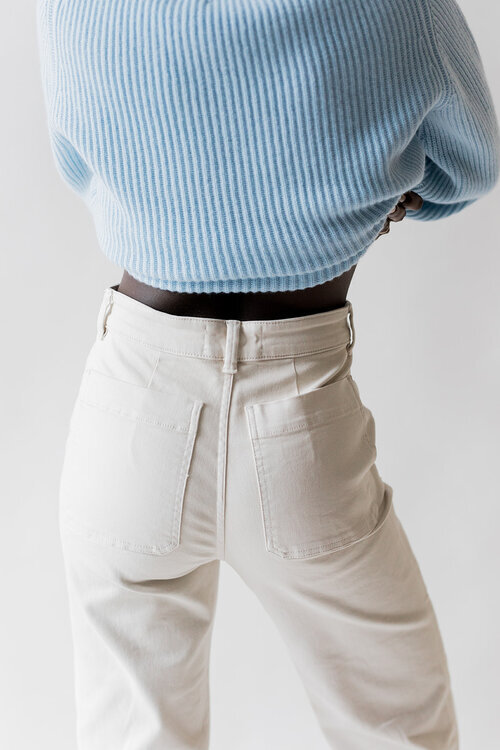
This One Question Reveals Why Money Is So Emotional
I logged into my bank account, queasy as I typed in my username and password. I clicked login and as the loading circle spun, I braced myself for the inevitable shame spiral.
I’d been unemployed for three months, living off savings while building a small business. Though I was doing more meaningful, engaging, and fulfilling work than ever before, reviewing my finances each month was a consistent knee-to-the-gut.
“Who was I if I wasn’t making money? What was I worth if the work that fulfilled me couldn’t pay my bills?”
As soon as the page on my browser loaded and revealed my dwindling savings, I instantly disqualified my business idea, efforts, and myself. For the first time in my life, my well-worn formula of “work in = money out” wasn’t computing. Though I’d made the decision to be without a consistent income for some time, I still couldn’t shake the anxiety. The lack of financial relief made me question everything. Who was I if I wasn’t making money? What was I worth if the work that fulfilled me couldn’t pay my bills?
Work harder. Spend less. Hustle and hoard. This solution auto-played through my mind like a tape on repeat, but until recently, I never knew where it originated, who pushed play, and why it felt so automatic. That was until one question helped me detangle the web of my relationship with work, money, and the self-worth tie between the two.
The one question to ask yourself about money
Before offering advice about budgeting, investing, or paying down debt, money expert Tori Dunlap, author of Financial Feminist, encourages readers to explore their unique narratives surrounding finances by returning to the start.
She begins with one question: “What is your earliest money memory?”
This stopped me in my tracks, partly because my earliest money memory was seemingly positive. I saw it in Radio Shack and had to have it: A Crocodile Hunter remote-control truck. Complete with a Steve Irwin action figure, plastic crocodile, and detachable boat secured to the rack with velcro, this dazzling toy electrified everything in my six-year-old brain when I saw it.
“I spent weeks taking on extra tasks to earn the money I needed to afford this toy — mopping, sweeping, dusting, and dishes — and each week, my mom paid me three dollars in return for my labor.”
Retailing for $59.99, my mom refused when I asked for it — but she quickly added, “If you work and save up, you can buy it yourself.” Fast-forward several months later. Between school and my normal chore load, I spent weeks taking on extra tasks to earn the money I needed to afford this toy — mopping, sweeping, dusting, and dishes — and each week, my mom paid me three dollars in return for my labor.
As soon as the crisp singles fell into my hands, I ran to my room and anxiously hid my earnings in a Little Mermaid-themed piggy bank under my bed, safe from the swiping of my siblings. Quickly, I learned that the more chores I took on and the harder I worked, the faster I would accumulate cash, bringing me closer to Steve Irwin, bit by bit, dollar by dollar. Hustle and hoard.
The message began ringing when I was six years old, and until I dove into this memory twenty-plus years later, I didn’t realize how that tape never stopped playing and how it’s affected my life since.
Discovering your money script
Research from the University of Cambridge suggests that by age seven, our beliefs surrounding money are solidified.
“By second grade, you’ve largely established how you will view and manage money as you move through life.”
– Tori Dunlap, author of Financial Feminist
Dunlap notes, “The majority of money habits are actually formed by age seven. […] By second grade, you’ve largely established how you will view and manage money as you move through life.”
The question, “What is your earliest money memory?” does more than prompt self-reflection. It exposes how our earliest experiences with money likely ripple into how we view and use it today.
Referring to a term initially coined by Psychologists Brad and Ted Klontz, fiduciary Michelle Wilson explains how “money scripts” are the “unconscious beliefs that we develop in childhood that tell us how we spend our money […] and we don’t even know that they’re there.”
Wilson goes on to acknowledge how the money beliefs we form as kids can “hold us hostage, they affect our self-image, and they can control our lives. I have even seen money scripts destroy people’s lives. And it doesn’t even matter how much money you have.”
“My money script of hustle and hoard may have helped me develop a strong work ethic and habit of saving, but it also made me chronically reactive to the amount in my bank account.”
My money script of hustle and hoard may have helped me develop a strong work ethic and habit of saving, but it also made me chronically reactive to the amount in my bank account. With this script running, I lived in fear of a catastrophe that could drain my savings and consistently equated how much I hustled and hoarded with how valuable I was as a person.
I only realized how much I gave productivity and its monetary return the power to determine my self-worth once I became curious about my earliest money memory and the beliefs it ingrained.
If you’re interested in unpacking your money script, I recommend Dr. Brad Klontz’s Money Script Inventory Test to discover the beliefs that may be informing your unconscious behavior regarding finances.
Rewriting your money script
Uncovering our scripts is one thing; rewriting them is another. It’s not enough to be aware of what they are and try to believe the opposite.
Trust me, I’ve tried. No amount of telling myself, “Just stop working so hard and penny-pinching so much,” has changed my mindset. Instead, we must understand what changing our scripts will do for our lives.
In a podcast episode with Retire Sooner Team, Associate Professor of Practice and Financial Psychology Ted Klontz urges us to envision the kind of life possible if we change our narratives around money. “What we’ve learned is that the clearer the image, the more likely they are to act. So why am I saving? […] Until you can envision a life better than what you have now, you’re not going to do anything,” says Klontz.
“Change is difficult, painful, and inconvenient. Even if we know our current mindsets aren’t serving us, we’ll likely return to what’s historically familiar.”
Change is difficult, painful, and inconvenient. Even if we know our current mindsets aren’t serving us, we’ll likely return to what’s historically familiar. Jonathan Decker, LMFT, says, “When the pain of staying the same is greater than the pain of changing, then you’ll change.”
For lasting impact, we have to buy into what we’ll gain on the other side of change. According to Klontz, the best place to start is visualizing in crisp detail what a life free from your unhelpful money scripts will look like.
“Compassionately identifying, uprooting, and replacing that script has forever changed my relationship with money.”
Tracing back the roots of this money script, my hustle and hoard mentality was adopted by a six-year-old who desperately wanted a remote-controlled truck. She hustled and hoarded her way there, but as the years rolled on, that script spilled over into workaholism, money anxiety, and shame about never meeting the mark.
Compassionately identifying, uprooting, and replacing that script has forever changed my relationship with money, my work to earn it, and how I let it define me. Watching my bank account load now, I feel a newfound groundedness, confidence, and peace, and it all began by asking one simple question.
What is your earliest money memory?
How did the way you remember money handled when you were a child spill over into your relationship with it now? How would waking up each morning with a different money script feel? Let us know your answers in the comments.
Cheyanne Solis is a copywriter relieving entrepreneurs to rest and invest more in what they love. She writes on practical wellness and mindful productivity from the perspective of sustainable work-life balance. Explore her work and connect here.



